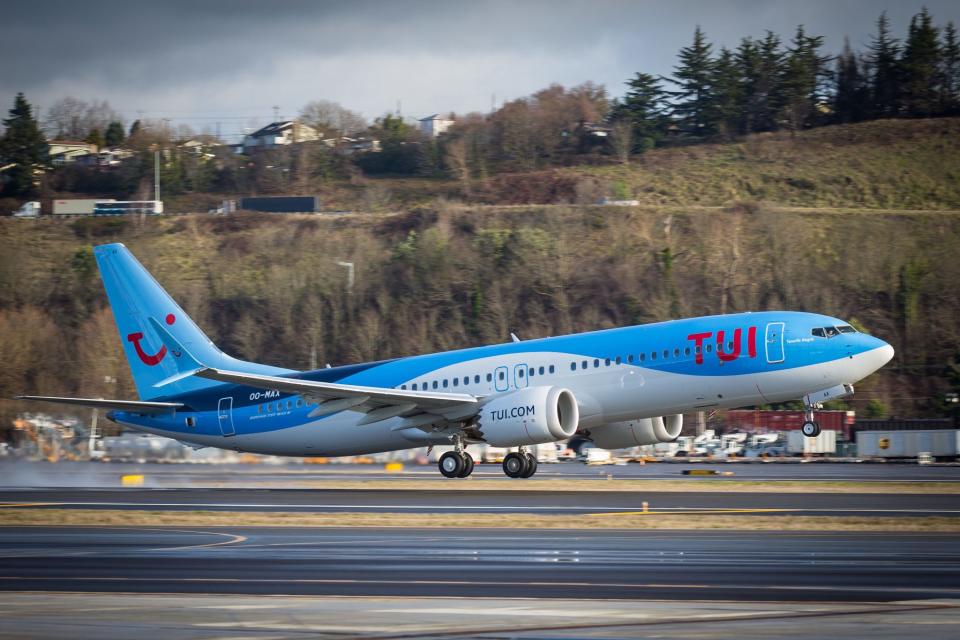TUI Faces ‘Significant’ Costs Due to Boeing Delays

TUI, one of Europe’s largest tourism companies, detailed the operational challenges posed by ongoing Boeing delivery delays during an earnings call on Wednesday.
The Boeing disruptions have forced TUI to extend leases on older aircrafts, impacting TUI’s financial performance and operational efficiency.
Despite these challenges, TUI had a strong quarter, with 16% revenue growth to $3.9 billion. The group reported its highest-ever results in the hotels, resorts and cruises segments, a 14% year-on-year rise in guests traveling on holiday, and a 9% growth in winter bookings.
Operational and Financial Challenges from Boeing
TUI CEO Sebastian Ebel said that the company received fewer Boeing aircraft than anticipated, which led to lease extensions on older aircraft.
TUI is in the middle of negotiations for compensation from Boeing.
“We have not planned at the moment for compensation, but definitely, there will be some,” Ebel stated. “This is annoying, but it’s not in our hands.”
The company faced “significant” costs due to higher lease rates and maintenance expenses associated with the older aircrafts, Ebel said.
TUI also is not expecting future delivery to pan out as planned. Last year, TUI had plans to order several Boeing 737 Max planes, with a planned 7 in its 2024 fiscal year, 24 planes in the 2025 fiscal year, and more aircraft beyond that.
Ebel said it had also hoped to secure access to the Max 10, which has yet to be certified. However, the company is hoping to keep a positive relationship with Boeing.
Ebel added that while TUI also has a good relationship with Airbus, it can’t offer the supply and the prices TUI needs at this time.
TUI is best known as a tourism provider, but it is also dependent on its significant aviation sector. TUI owns five European carriers that collectively operate 130 medium and long-haul aircraft.
TUI’s chief airline officer, Marco Ciomperlik, told Skift in a recent interview that the group plans to integrate the Boeing 737 Max 10 into its fleet to improve efficiency and consolidate operations under one brand.
TUI’s robust quarter
Hotels, cruises and TUI Musement, the activities arm of the group, are all “very well on track” and delivering “above expectations,” said Ebel. “Strong demand is continuing.”
The winter spikes were attributed to higher average booking prices and temperate weather that motivated last-minute bookings. TUI was especially successful in the United Kingdom and German markets this quarter, which rose 3% and 7%, respectively.
The company’s “hotels and resorts” segment achieved record earnings of $127 million (€117 million) this quarter. The performance resulted from a 9% increase in overnight stays and higher room rates, particularly at TUI’s luxury Spanish hotel chain, Riu.
The cruise sector saw occupancy rates rise by 6 percentage points to 98% year-on-year. The growth largely came from the company’s UK cruise business, Marella, and from the German-speaking area that uses TUI cruises.
TUI Musement, the experiences and activities arm of the company, had a 15% increase in revenue to $161.8 million. Executives said that the activities will be pursuing more business-to-business opportunities with tour operators.
Yet the company was unprofitable for the year, with an operating loss in the January-March period of about $205 million (189 million euro). It forecasted 10% year-over-year revenue growth and a 25% jump in operating profit for its fiscal year ending in September.
A debate over pricing
The company is harnessing dynamic prices to more easily adjust prices based on demand and other factors. Dynamic packaging of airfares and lodging was another major driver of profitability, with a 30% gross increase this quarter.
“We are seeing high demand for package holidays, in particular, which we are producing more and more flexibly and dynamically and which continue to offer the highest level of protection for our customers,” Ebel said.
The company increased prices by 4% for this summer largely by charging more for high-demand hotel and cruise offerings. Ebel attributed the increase to general market inflation rates.
Ebel suggested that if TUI doesn’t sell enough vacations early in the season, they may have to lower prices later in the season. This depends in part on whether competitors start offering discounts.

TUI’s Chief Airline Officer Talks Summer 2024 and Boeing Orders
Get breaking travel news and exclusive hotel, airline, and tourism research and insights at Skift.com.

 Yahoo Finance
Yahoo Finance 